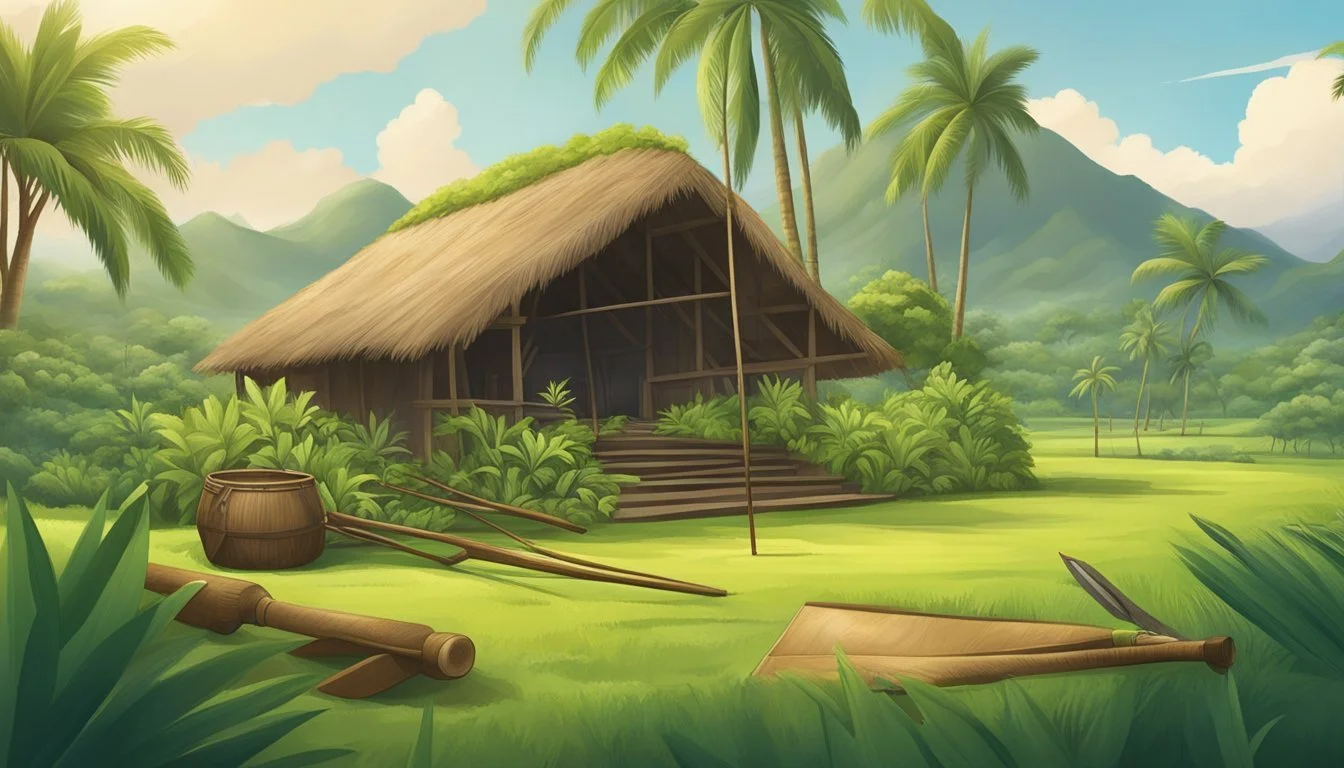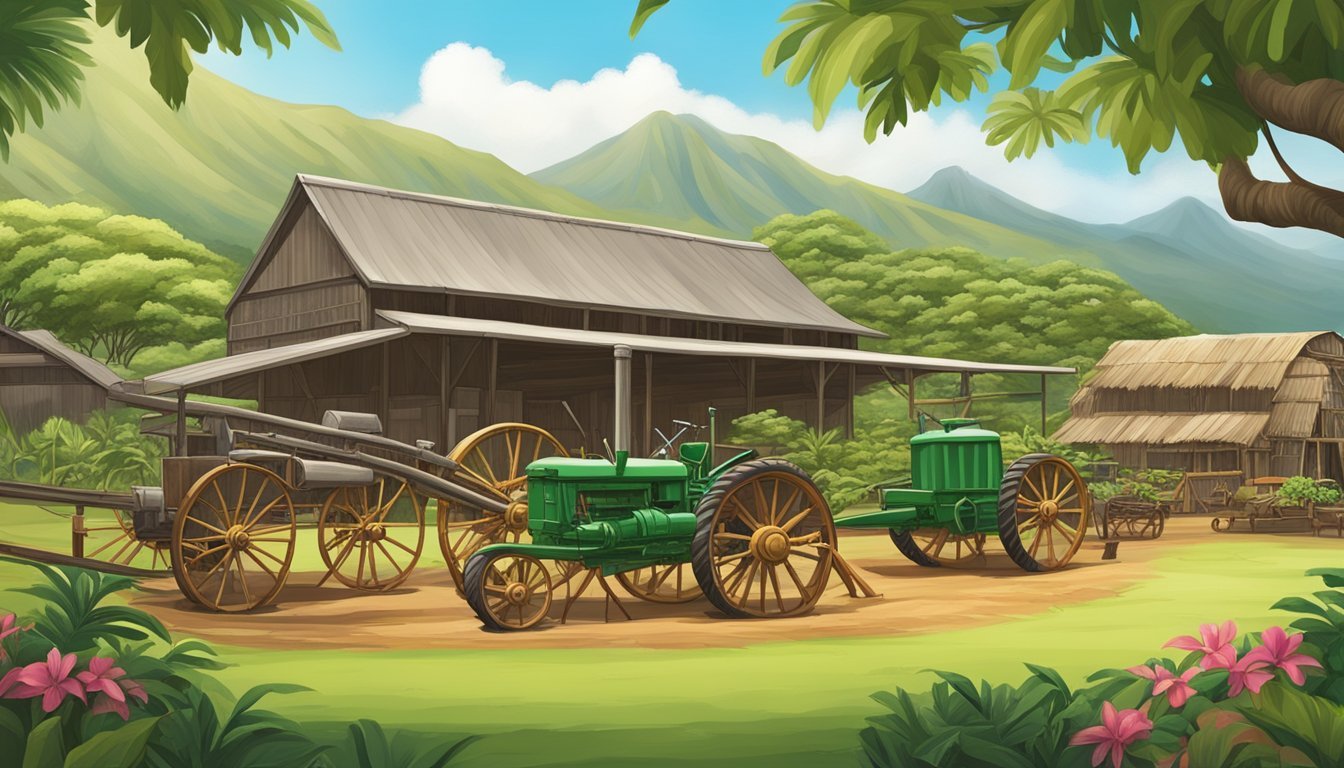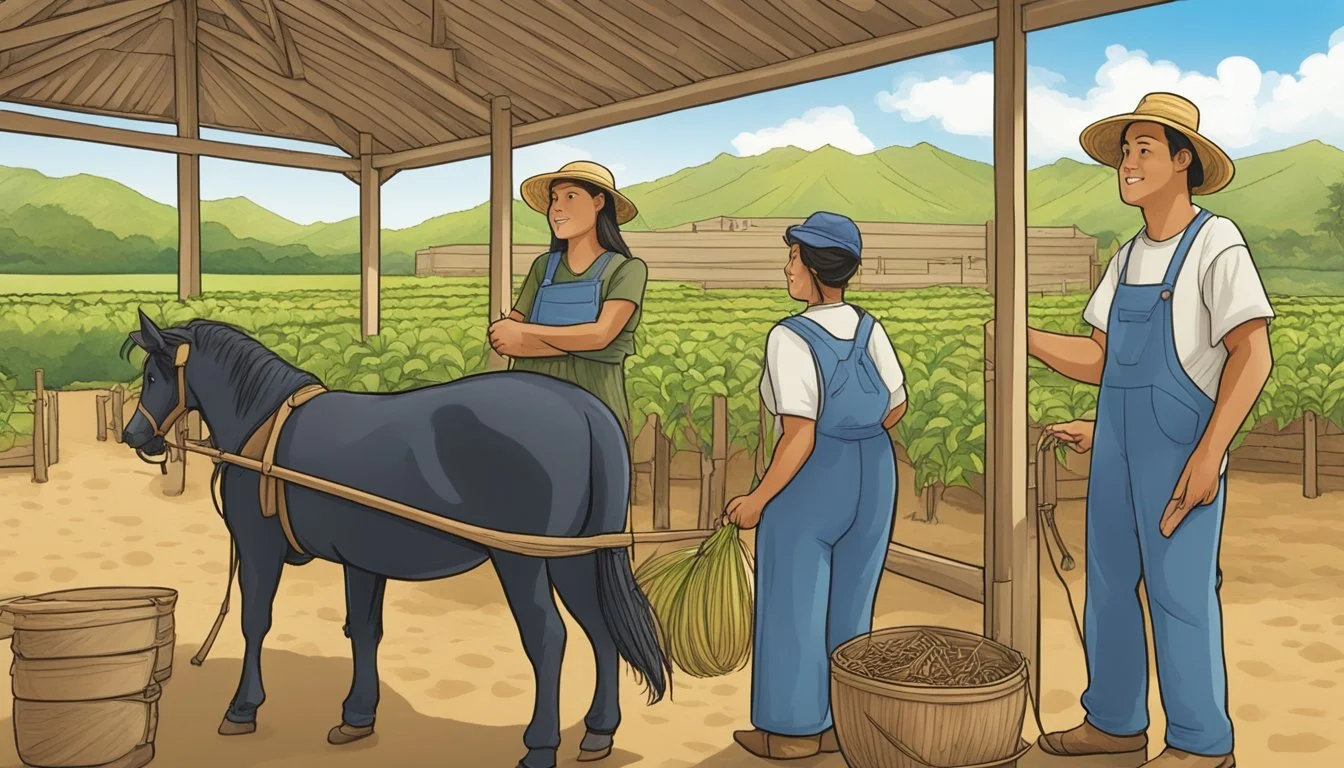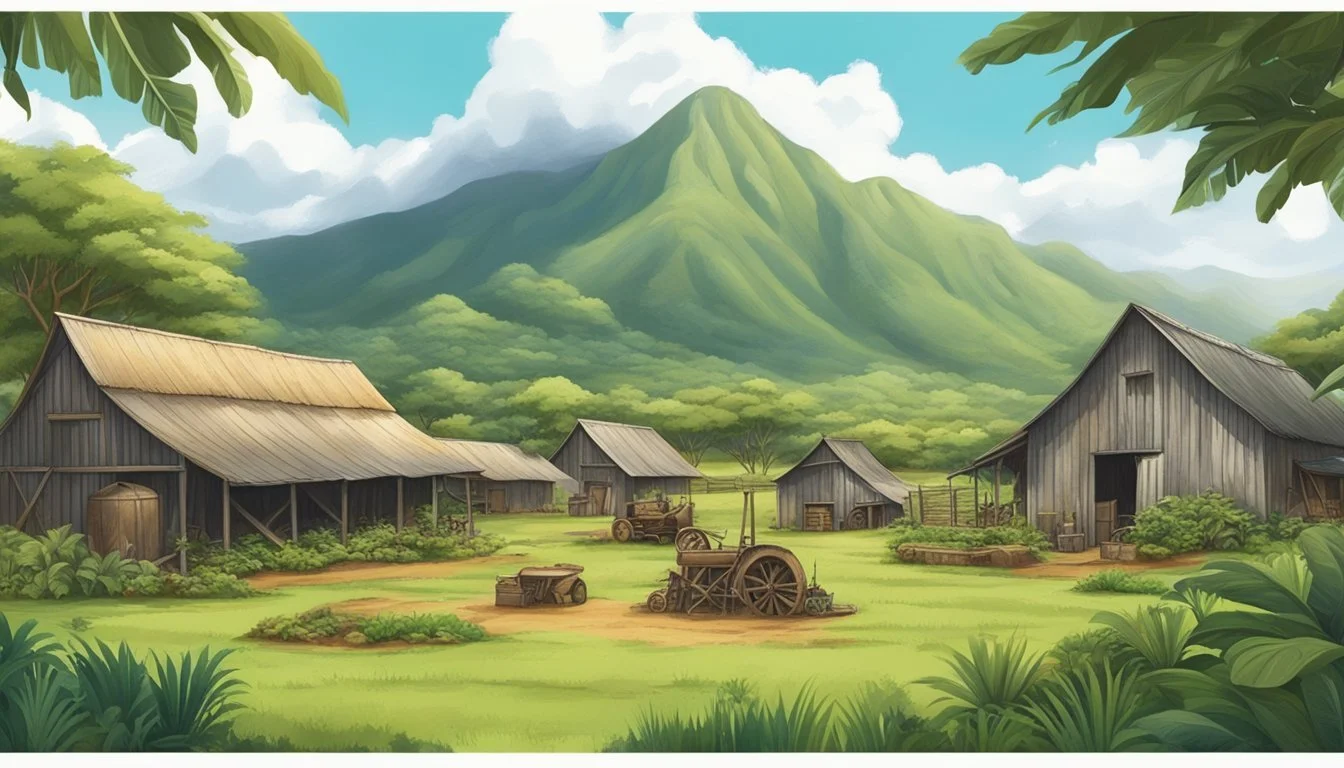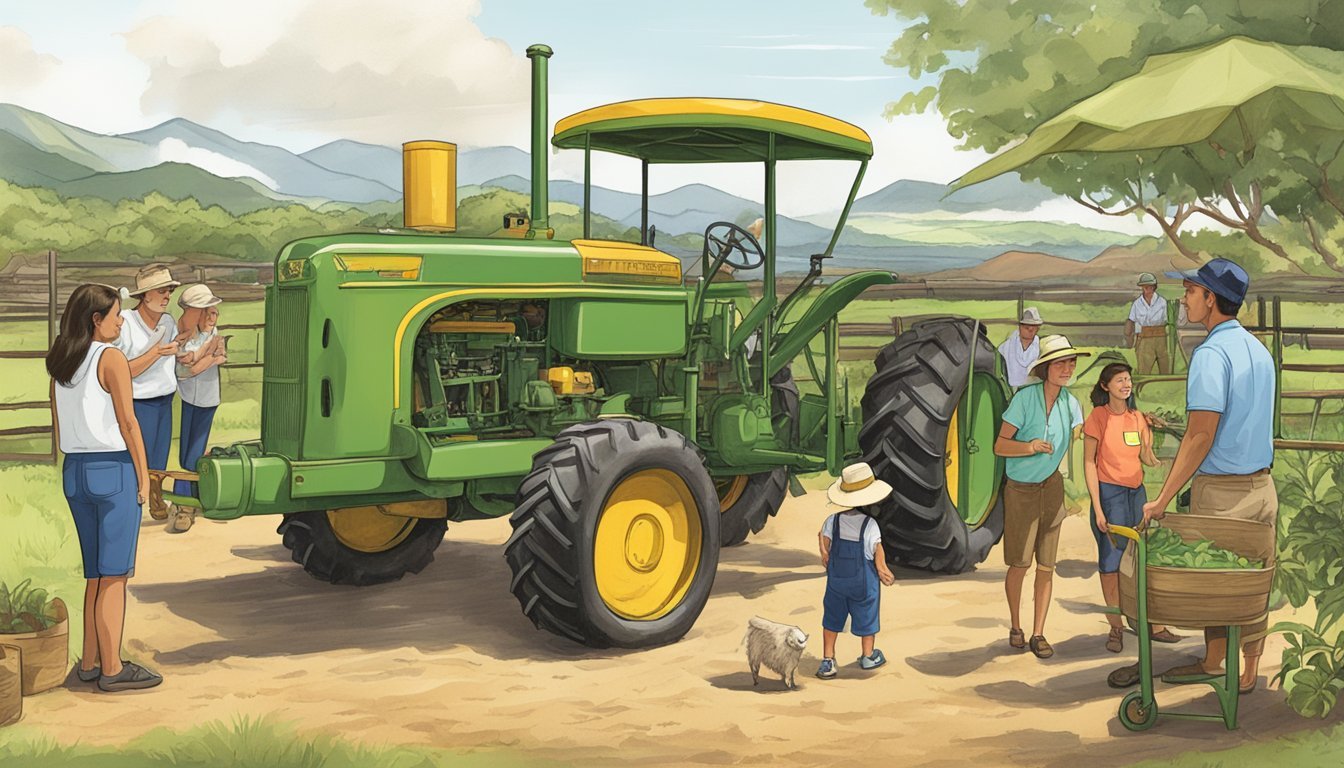Historical Farms and Agricultural Museums in Hawaii
A Guide to Island Agritourism Attractions
Hawaii's rich agricultural heritage is preserved and celebrated in various historical farms and agricultural museums across the islands. These sites offer visitors a glimpse into the past, showcasing the traditional farming techniques and the history of plantation life that shaped the archipelago's economy and culture. Among these, the Kona Coffee Living History Farm stands out as a significant destination, enabling tourists to experience the legacy of coffee cultivation in Hawaii, a crop synonymous with the Kona region.
A visit to these historical sites is not just about delving into the annals of Hawaiian agricultural history, but also about engaging with the interactive and educational aspects that these museums provide. The Grove Farm on Kauai is another prime example. It serves to educate visitors on the history of sugar plantations, an industry that once played a pivotal role in the islands’ development. Maintained with great care, these homesteads and farms offer an authentic experience, with preserved buildings and artifacts that tell the story of the diverse cultural influences that have shaped the Hawaiian Islands.
With each farm or museum visit, one can expect to engage directly with Hawaii's agricultural past, ensuring that the stories and knowledge of prior generations are not lost. Through the continued efforts of these institutions, the importance of agriculture in Hawaii's history is honored and remembered, providing valuable context for locals and tourists alike as they navigate and appreciate the islands’ present-day landscapes.
History of Agriculture in Hawaii
Hawaii's rich agricultural history spans from ancient native traditions to its current diverse agricultural landscape.
Pre-Colonial Era and Indigenous Practices
Long before the arrival of Europeans, Hawaiians developed a sophisticated land management system known as ahupua'a, which was central to pre-colonial agriculture. These subdivisions stretched from the mountains to the sea and included all the resources needed for the Hawaiian kapu system—a set of religious laws including resource management. Traditional Hawaiian agriculture was integrated and sustainable, with fish ponds, tarot fields, and rain-fed dryland farming.
Introduction of Sugarcane and Coffee
The introduction of sugarcane to Hawaii is marked by its arrival with the Polynesians, but its commercial production began in the 1800s. Likewise, coffee began to gain prominence, with Kona coffee becoming an iconic Hawaiian product. Both crops drastically reshaped Hawaii's agricultural landscape due to their economic significance.
The Sugar and Pineapple Plantation Era
Hawaii's agricultural identity became strongly tied to its sugar and pineapple plantations during the 19th and 20th centuries. The founding of the Hawaii Sugar Planters Association (HSPA) in 1895 and the mass production and exportation of pineapple catapulted the islands onto the global economic stage. Immigrant laborers from Asia were instrumental in the growth and success of this era.
Period of Diversification and Modernization
As the plantation era gave way, Hawaii saw a period of diversification in agriculture from the 1960s. The focus shifted to a variety of crops beyond sugar and pineapple, such as macadamia nuts, coffee, and tropical flowers and fruits. Modern practices and technologies began to be incorporated, moving toward a more sustainable and diversified agricultural system that better supports the local economy and food supply.
Key Agricultural Museums and Historical Farms
Hawaii offers a unique perspective on agricultural history through its collection of museums and historical farms. Visitors can explore the rich heritage of these islands and learn about the agrarian lifestyle that once flourished here.
Grove Farm and Waioli Mission House
Grove Farm offers a glimpse into the island's sugar cane farming past and the development of Kauai. It includes the original plantation homestead of George N. Wilcox, a prominent figure in Kauai's agricultural history. Waioli Mission House complements this experience with its restored missionary home and school, illustrating the impact of Christian missionaries on the Hawaiian way of life.
Kona Coffee Living History Farm
Located in Kona, this farm is the only living history museum dedicated to telling the story of Kona's coffee pioneers. Visitors can learn about the cultivation and processing of coffee beans on a working farm dating back to the early 1900s, providing insight into the lives of early Japanese immigrants in Hawaii.
Hawaii's Plantation Village
This outdoor museum in Oahu provides a full immersion into the multicultural plantation life of Hawaii. Restored buildings and replicas showcase the homes and work environments of the various ethnic groups that came to Hawaii to work on sugar plantations. It represents a significant chapter in Hawaiian history and the development of its agricultural industry.
Educational Programs and Outreach
In Hawaii, historical farms and agricultural museums offer diverse educational programs and outreach activities. These programs are designed to connect various groups, including students, children, and adults, to the rich agricultural heritage of the islands.
School and Group Visits
Schools and educational groups have the opportunity to engage in guided tours at places like Kona Coffee Living History Farm. These visits showcase the farm's operations and the history of coffee production in Hawaii. They are tailored for different age groups, offering hands-on learning experiences that align with curriculum goals.
Public Tours and Events
For the general public, programs such as EAT THINK DRINK are instrumental in highlighting the importance of agriculture. Events like Localicious Hawaii and walking tours enable adults and children alike to gain insight into sustainable farming practices and local food production.
Workshops and Agricultural Training
Agricultural training workshops cater to individuals interested in farming careers or those seeking deeper knowledge of agriculture. The Hawai'i Agricultural Foundation provides resources such as the "Where Would We Be Without Seeds" program to broaden understanding of agriculture's role in society through STEM-focused activities.
Conservation and Research Initiatives
Hawaii's rich agricultural heritage is preserved and promoted through various conservation and research initiatives. These efforts are led by dedicated organizations and associations which include but are not limited to the Oahu Resource Conservation and Development Council, the Oahu Agriculture and Conservation Association, and partnerships with national entities such as the National Park Service and the U.S. Department of Agriculture.
Sustainable Agriculture and Practices
The Oahu Resource Conservation and Development Council aims to enhance the quality of life by fostering education and adoption of sound conservation practices. They collaborate with rural enterprises to promote sustainable practices.
The Oahu Agriculture and Conservation Association (OACA) aids in the growth of agricultural capacity through conservation planning and technical support. Utilizing grants, loans, and educational programs, they champion sustainable land management.
Cultural Preservation and Studies
Through collaboration with the National Park Service, significant strides have been made in preserving historical farms and properties, ensuring cultural practices remain intact. The Association for Living History, Farm and Agricultural Museums (ALHFAM) provides a network where professionals conserve customs tied to agricultural livelihoods. The U.S. Department of Agriculture supports research and studies promoting agricultural practices and technologies that respect Hawaii's unique cultural history.
Visitor Information
Visitors planning trips to historical farms and agricultural museums in Hawaii will find that each location offers unique experiences. Information regarding operating hours, admission fees, membership privileges, and opportunities for making reservations and donations is available to assist in planning a well-informed visit.
Operating Hours and Admission Details
Most historical farms and agritourism destinations operate on specific days of the week, often excluding Mondays for maintenance. For instance, the Kona Coffee Living History Farm invites guests to step back in time, but it is essential to note that it is closed on weekends. When planning a visit, one should:
Check the individual websites for the current operating hours as they may vary by season or event.
Confirm admission fees in advance; many places charge an entry fee to cover the upkeep and educational services.
Example:
Entity Days Open Admission Fee Kona Coffee Living History Farm Tuesdays through Fridays Suggested donation of $15 for adults
Membership, Reservations, and Donations
Memberships often offer recurring benefits, such as unlimited visits, discounts at gift shops, or exclusive event invites. Reservations may be required for certain activities or tours, ensuring a spot on a preferred date. Donations, on the other hand, play a crucial role in the preservation and education initiatives these historic sites provide:
Membership: Look for annual membership options that align with visitation plans and interests.
Reservations: Recommended for special tours or experiences to guarantee availability, especially for larger groups.
Donations: Welcomed and often tax-deductible, contributions aid in the continuation of these cultural treasures.
Example:
Membership: Annual family memberships could include newsletters and discounts on special programs.
Reservations: Required for particular events, like night tours or harvest festivals.
Donations: Accepted on-site or through official websites, with different tiers and recognition for supporters.
Special Collections and Archives
In Hawaii, historical societies and museums offer a rich tapestry of agricultural history through their special collections and archives. These repositories safeguard plantation records, agrarian artifacts, and other memorabilia that convey the islands' unique agricultural past.
Archives of Plantation Records
At the heart of many Hawaiian historical collections are the archives of plantation records. These archival materials provide a detailed look at the agricultural heritage of Hawaii, from coffee to sugarcane. The Kona Historical Society maintains a significant collection, including over 140 maps and numerous oral history interviews that capture the experiences of those who worked on Kona's pastures and farms.
Agrarian Artifacts and Memorabilia
Memorabilia and artifacts related to Hawaii's agrarian history are meticulously preserved in historical museums. Visitors can find collections that include tools used in the mills and gardens, personal items belonging to missionary teachers, and artifacts from daily life in Hawaii's agricultural communities. Furthermore, the Kona Coffee Living History Farm offers a practitioner's look into farm life, with its unique collection of artifacts and annual events that recreate the experiences of early 20th-century coffee farmers.
Engaging with the Community
Historical farms and agricultural museums in Hawaii provide an incredible opportunity for the community to actively participate and contribute to the preservation and celebration of the islands' rich agrarian heritage. This engagement is facilitated through diverse avenues, including volunteer programs and partnerships, as well as cultural festivities that honor traditional practices and local produce.
Volunteer Opportunities and Partnerships
Hawaii's historical farms and museums frequently offer volunteer opportunities that allow individuals to immerse themselves in the stewardship of local history. The Kona Historical Society, as an example, thrives on the dedication of volunteers who help in collecting, preserving, and sharing the stories of the Kona district. These volunteers do not only gain a deeper understanding of the region's past but also contribute to a vibrant community that honors Hawaii's legacy.
Partnerships are another critical component, fostering collaboration between history-focused organizations and local businesses. Such alliances augment resources and outreach, allowing historical sites to flourish and expand their impact on both residents and visitors.
Cultural Festivals and Market Days
Cultural festivals and market days epitomize the vibrant essence of Hawaii's agrarian community. They often integrate historical re-enactments, traditional crafts, and local gastronomy. At the Kona Coffee Living History Farm, for instance, visitors can experience the life of early 20th-century coffee farmers, thanks to interpreters engaging them with stories set against the backdrop of a preserved and operational coffee farm.
Market days allow local farmers to share their produce, contributing to the sustainability of Hawaii's agrarian economy and offering people a taste of regional specialties. Through these celebratory events, historical farms etch the importance of agriculture into the fabric of community life, reinforcing their role as both preservers of the past and cultivators of a shared future.

